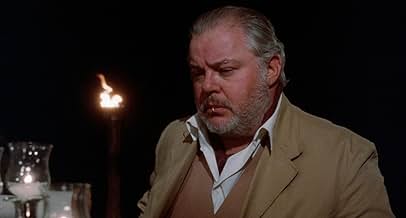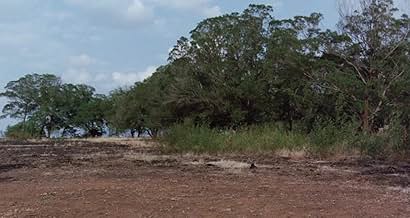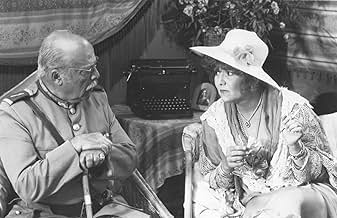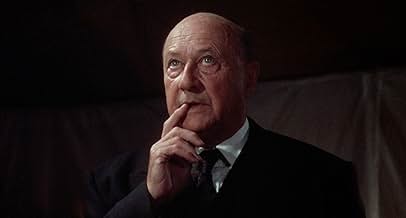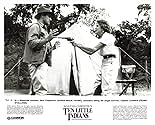IMDb-BEWERTUNG
4,7/10
1804
IHRE BEWERTUNG
Füge eine Handlung in deiner Sprache hinzuTen people are invited to go on an African safari, only to find that an unseen person is killing them one by one. Could one of them be the killer?Ten people are invited to go on an African safari, only to find that an unseen person is killing them one by one. Could one of them be the killer?Ten people are invited to go on an African safari, only to find that an unseen person is killing them one by one. Could one of them be the killer?
- Regie
- Drehbuch
- Hauptbesetzung
Sarah Maur Ward
- Vera Claythorne
- (as Sarah Maur Thorp)
Candice Hillebrand
- Schoolgirl at Train Window
- (Nicht genannt)
Bill Mitchell
- Mr. U.N. Owen
- (Nicht genannt)
Empfohlene Bewertungen
Ten Little Indians is pure poetry! I loved it...The cast is A-class. Donald Pleasence, Brenda Vaccaro, Paul L. Smith and Yehuda Efroni as Dr. Werner is superb. I was compelled after viewing this film to go on a Murder mystery weekend...Rent this film out! I loved it...Happy veiwing.
Agatha Christie tale of 10 people invited to an isolated place , hovering around mouthing chunks of exposition while waiting to get murdered . The guests discuss and argue each other , only to find that an unseen person is killing them one by one . Just before the gripping climax of the film , you will be given sixty seconds to guess the killer's identity! The film will pause and on the screen you will see clues to help you decide who the murderer is...but the person in suspect is always the person who is murdered next . There is no way for any of them to flee , so they set about attempting to determine who their hidden host might be and where he might be hiding.
Whodunit in which have been invited ten people who are strangers to each other , when they are all gathered, they hear from their host that each one of them has in someway caused the death of an innocent person and that justice had not be served in their cases , the guests are being killed off one by one . Average fourth adaptation , this one totally mucks up the story , switching from an isolated island to African landscapes located in the sabana . The original script was much more faithful to the original Agatha Christie novel with the setting on an island and the original grim conclusion of the book ; however, producer Harry Alan Towers changed it at the last second when he realized that it would be cheaper to shoot in the African outback and that the novel's ending is less marketable than Christie's happier resolution from the play version of the story . Excruciantly boring and dull rendition with silly characters and slowly paced . Most actors are mediocre and unknown , though there are tree important players as Donald Pleasence , Brenda Vaccaro and Herbert Lom who had acted in a previous remake playing the doctor . The whole cast overacts abysmally and playing cardboard roles against poor scenarios and some old tents . This low-budgeted picture is a real tedium and tiring ; sticks with the original version . The motion picture was regularly directed by Alan Birkinshaw who was in South Africa filming various films for producers Avi Lerner and Harry Alan Towers such as Masque of the Red Death , The House of Usher , Horror Safari and this ¨Ten little Indians¨ filmed with similar artistic and technician team .
This is one of the innumerable versions based on Agatha Christie famous novel . The best version (1945) resulted to be the classic by Rene Clair with Barry Fitzgerard , Roland Young , June Duprez , Mischa Auer , C Aubrey Smith , Judith Anderson and Richard Haydn ; furthermore , 1965 version set in Austrian Alps by George Pollock with Hugh O'Brian as Hugh Lombard , Shirley Eaton as Ann Clyde , Fabian as Mike Raven , Leo Genn as General Mandrake as Stanley Holloway as William Blore , Wilfrid Hyde-White as Judge Cannon and Daliah Lavi as Ilona Bergen . And 1974 rendition set in remote Iran by Peter Collinson with Charles Aznavour , Maria Rohm , Adolfo Celi , ElKe Sommer , Stephane Audran , Alberto De Martino , Richard Attenborough and Herbert Lom .
Whodunit in which have been invited ten people who are strangers to each other , when they are all gathered, they hear from their host that each one of them has in someway caused the death of an innocent person and that justice had not be served in their cases , the guests are being killed off one by one . Average fourth adaptation , this one totally mucks up the story , switching from an isolated island to African landscapes located in the sabana . The original script was much more faithful to the original Agatha Christie novel with the setting on an island and the original grim conclusion of the book ; however, producer Harry Alan Towers changed it at the last second when he realized that it would be cheaper to shoot in the African outback and that the novel's ending is less marketable than Christie's happier resolution from the play version of the story . Excruciantly boring and dull rendition with silly characters and slowly paced . Most actors are mediocre and unknown , though there are tree important players as Donald Pleasence , Brenda Vaccaro and Herbert Lom who had acted in a previous remake playing the doctor . The whole cast overacts abysmally and playing cardboard roles against poor scenarios and some old tents . This low-budgeted picture is a real tedium and tiring ; sticks with the original version . The motion picture was regularly directed by Alan Birkinshaw who was in South Africa filming various films for producers Avi Lerner and Harry Alan Towers such as Masque of the Red Death , The House of Usher , Horror Safari and this ¨Ten little Indians¨ filmed with similar artistic and technician team .
This is one of the innumerable versions based on Agatha Christie famous novel . The best version (1945) resulted to be the classic by Rene Clair with Barry Fitzgerard , Roland Young , June Duprez , Mischa Auer , C Aubrey Smith , Judith Anderson and Richard Haydn ; furthermore , 1965 version set in Austrian Alps by George Pollock with Hugh O'Brian as Hugh Lombard , Shirley Eaton as Ann Clyde , Fabian as Mike Raven , Leo Genn as General Mandrake as Stanley Holloway as William Blore , Wilfrid Hyde-White as Judge Cannon and Daliah Lavi as Ilona Bergen . And 1974 rendition set in remote Iran by Peter Collinson with Charles Aznavour , Maria Rohm , Adolfo Celi , ElKe Sommer , Stephane Audran , Alberto De Martino , Richard Attenborough and Herbert Lom .
For the most part this film is populated by some wonderful character actors.
Agatha Christie's original storyline is beyond reproach.
With building blocks like that to work with it's a wonder that director Alan Birkinshaw wasn't able to deliver something a little closer to the quality that thousands of Agatha Christie fans have come to expect. "Ten Little Indians" failed at nearly every level, from a poor script, to inept blocking and unimaginative camera angles, to cheap dime store sets and props, to trying to sensationalize Christie's wit by replacing it with crude graphic violence.
There have been other film adaptations of "Ten Little Indians" all of them head and shoulders above this one. On three prior occasions I've tried to sit through this film but without success. Today, just after having seen "And Then There Were None" (an excellent adaptation of "Ten Little Indians") Birkinshaw's version came on and I determined to sit through it all the way. My reward for that ordeal was to have the right to pan it publicly.
Agatha Christie's original storyline is beyond reproach.
With building blocks like that to work with it's a wonder that director Alan Birkinshaw wasn't able to deliver something a little closer to the quality that thousands of Agatha Christie fans have come to expect. "Ten Little Indians" failed at nearly every level, from a poor script, to inept blocking and unimaginative camera angles, to cheap dime store sets and props, to trying to sensationalize Christie's wit by replacing it with crude graphic violence.
There have been other film adaptations of "Ten Little Indians" all of them head and shoulders above this one. On three prior occasions I've tried to sit through this film but without success. Today, just after having seen "And Then There Were None" (an excellent adaptation of "Ten Little Indians") Birkinshaw's version came on and I determined to sit through it all the way. My reward for that ordeal was to have the right to pan it publicly.
Agatha Christie's Ten Little Indians has been set in some strange places. This version is no exception. Instead of being set in a Ski resort/castle, or a Hotel in the desert, this version has them on Safari in the middle of Africa! While this would not be my first choice of setting, it's actually pretty good. The acting is not the best, but it's still watchable. This is the first version Saw, basically because Herbert Lom was in it, and I was suprised when the murderer,(I can't say who)was revealed. This version, however, did something that the 1966 and 1974 versions didn't. they actually changed the dialog. Anyone who has seen the 3 previous versions (I have seen all four)will certainly remember the 2 englishmen on an island story . While I can't lie and say this is the best of the versions, it's still one you should see!
trivia: This is Herbert Lom's second appearance in a Ten Little Indians movie. He played Dr. Armstrong in the previous version!
trivia: This is Herbert Lom's second appearance in a Ten Little Indians movie. He played Dr. Armstrong in the previous version!
The 1989 film has some good points, but, unlike the 1945, 1965, and 1974 versions, it grows less enjoyable with each viewing. Everything about it seems low-budget. The cast and script are undistinguished. The set is drab. The clothes look like cheap costumes. The plot takes too long to get going. Once it does, it unfolds well at first, with the early deaths resembling accidents. And, bettering all prior versions, the ending is dramatic, conveys murderous host Owen's menace and lunacy, and most fully explains Owen's behavior.
Overall, however, the storytelling is inept. Too much is out of Owen's control, such as natives cutting down the basket that carries people down from the cliff and Lombard repairing the radio. After the third death, someone abruptly announces without any discussion or reasoning that "Mr. Owen is one of us." Unlike the other versions, the characters engage in no deductive reasoning or survival techniques.
The story drags. Only making matters worse are cheap, forced attempts to gin up suspense. These include the camera suddenly coming up short on characters; a character acting "awfully nervous" for no reason; and pratfall-type death scenes, with a body tumbling down from on top of a tent, another toppling out of a closet, mouth gaping, and another slumping forward with an ax in the back of the head.
Touches that made earlier versions entertaining are botched in 1989. The other films recite the full nursery rhyme up front, creatively playing it on the piano. But this script dribbles the rhyme out line by line upon each murder. Instead, it chooses to play "Mad Dogs and Englishmen," an annoying, madcap, out-of-place Noel Coward song with no apparent connection to Christie or appropriateness to this adaptation, which has so few British characters. This film makes an embarrassing hash of the scene in which the phonograph record is played accusing each person of a past crime. Repeatedly, the person whose name is unexpectedly about to be called next happens to pipe up with some exaggerated utterance, on cue, right before being named.
The 1989 film fails to discuss some past crimes at all (doctor, judge, Lombard). It distorts others (Blore, Marshall), to no good effect. In place of Christie's subtle crime of withheld care, Rodgers merely refers to an old lady in his care who "died of a massive stroke." In the film, Marston refers to a "couple running out in front of his car," without any mention of them being newlyweds or of him driving fast and drunk. The film dumbs down the book's most complex, interesting past crime to a bland reference to a child in Vera's care drowning.
All the good lines from other versions are gone in 1989, like "a feeling that some sort of macabre joke is being played on us," "game of the mind." In 1989, other than Owen's line "My own private big game hunt," there are just limp banalities ("The devil is among us"; Our duty, that's all any of us can hope to do"; "I never bet"; "When we get out of here, I'm going to teach you to shoot straight") or lines memorable only for making you cringe (judge, "I left immediately...to relieve myself"; Lombard to Vera, "Feel it, smell it," about gun).
In 1989, the casting and acting, strong points in past adaptations, go badly awry. An exception is Herbert Lom's delightfully dotty performance as the general, better than 1945, including a touching scene with Vera explaining his past. But Donald Pleasance is adrift, mostly acting detached and insipid, then suddenly erupting in a panic outburst or frantically pawing in a snuff box. Not until his final moments on screen does he play his character coherently and effectively.
Sarah Maur Thorp brings youthful energy and emotion to the role of Vera. But her acting becomes erratic and mechanical as she turns increasingly into a mere screaming hysteric, unlike June Duprez, who keeps a strong, intelligent presence during the 1945 film.
Brenda Vaccaro's uninspired, formless performance as actress Marshall consists of sighing, huffing, lounging around, and boozing. It is unbelievable that this plump, pampered lush would go on an African safari. Her only explanation? "I was invited. I received a letter in the post."
Blore's character has always been well-defined and well-acted before. But here, played by a bit-part TV character actor, he is just roly-poly, rough, loud, and sulky. His mumbled confession of his past crime is confused and miserably ineffective.
Marston, who rushes through a 2-second singing bit, the worst musical performance of any version, is a caricature of a fop. The film fails to place him in the context of a dissolute career or even mention his penchant for liquor and fast sportscars.
Paul Smith as Rodgers tries to let his hulking body do his acting for him, as Moira Lister, the wife, does with her shrill voice. He lumbers around scowling and bellowing laconically. She overacts as a loud, whiny motormouth. Their characters and relationship are not remotely believable.
Apparently, Frank Stallone's only qualification for Lombard was being a "hunk." His weak, vacant expressions and flat delivery are evident from his very first line. His acting is exemplified by the scene in which he shoves a pistol in Vera's face and cocks the trigger, oblivious that he has already started mouthing the line, "I'm sorry, I didn't mean to scare you." Stallone's constant, supposedly sly, cocky grins destroy any sense of suspense. His only explanation for being there: "Owen had already paid [a friend's] way out, so I came instead."
Worst of all, Yehuda Efroni ruins the important character of the doctor. His bizarre, introverted, bug-eyed portrayal lacks any air of authority, intellect, charm, or even social skills. Through a heavy accent, he either stammers or, like a snapping turtle, spits out snippets of inarticulate dialogue. At one point, he cackles, at another acts befuddled, for no reason at all. Unlike any prior version, the doctor has no rapport with any other character.
Overall, however, the storytelling is inept. Too much is out of Owen's control, such as natives cutting down the basket that carries people down from the cliff and Lombard repairing the radio. After the third death, someone abruptly announces without any discussion or reasoning that "Mr. Owen is one of us." Unlike the other versions, the characters engage in no deductive reasoning or survival techniques.
The story drags. Only making matters worse are cheap, forced attempts to gin up suspense. These include the camera suddenly coming up short on characters; a character acting "awfully nervous" for no reason; and pratfall-type death scenes, with a body tumbling down from on top of a tent, another toppling out of a closet, mouth gaping, and another slumping forward with an ax in the back of the head.
Touches that made earlier versions entertaining are botched in 1989. The other films recite the full nursery rhyme up front, creatively playing it on the piano. But this script dribbles the rhyme out line by line upon each murder. Instead, it chooses to play "Mad Dogs and Englishmen," an annoying, madcap, out-of-place Noel Coward song with no apparent connection to Christie or appropriateness to this adaptation, which has so few British characters. This film makes an embarrassing hash of the scene in which the phonograph record is played accusing each person of a past crime. Repeatedly, the person whose name is unexpectedly about to be called next happens to pipe up with some exaggerated utterance, on cue, right before being named.
The 1989 film fails to discuss some past crimes at all (doctor, judge, Lombard). It distorts others (Blore, Marshall), to no good effect. In place of Christie's subtle crime of withheld care, Rodgers merely refers to an old lady in his care who "died of a massive stroke." In the film, Marston refers to a "couple running out in front of his car," without any mention of them being newlyweds or of him driving fast and drunk. The film dumbs down the book's most complex, interesting past crime to a bland reference to a child in Vera's care drowning.
All the good lines from other versions are gone in 1989, like "a feeling that some sort of macabre joke is being played on us," "game of the mind." In 1989, other than Owen's line "My own private big game hunt," there are just limp banalities ("The devil is among us"; Our duty, that's all any of us can hope to do"; "I never bet"; "When we get out of here, I'm going to teach you to shoot straight") or lines memorable only for making you cringe (judge, "I left immediately...to relieve myself"; Lombard to Vera, "Feel it, smell it," about gun).
In 1989, the casting and acting, strong points in past adaptations, go badly awry. An exception is Herbert Lom's delightfully dotty performance as the general, better than 1945, including a touching scene with Vera explaining his past. But Donald Pleasance is adrift, mostly acting detached and insipid, then suddenly erupting in a panic outburst or frantically pawing in a snuff box. Not until his final moments on screen does he play his character coherently and effectively.
Sarah Maur Thorp brings youthful energy and emotion to the role of Vera. But her acting becomes erratic and mechanical as she turns increasingly into a mere screaming hysteric, unlike June Duprez, who keeps a strong, intelligent presence during the 1945 film.
Brenda Vaccaro's uninspired, formless performance as actress Marshall consists of sighing, huffing, lounging around, and boozing. It is unbelievable that this plump, pampered lush would go on an African safari. Her only explanation? "I was invited. I received a letter in the post."
Blore's character has always been well-defined and well-acted before. But here, played by a bit-part TV character actor, he is just roly-poly, rough, loud, and sulky. His mumbled confession of his past crime is confused and miserably ineffective.
Marston, who rushes through a 2-second singing bit, the worst musical performance of any version, is a caricature of a fop. The film fails to place him in the context of a dissolute career or even mention his penchant for liquor and fast sportscars.
Paul Smith as Rodgers tries to let his hulking body do his acting for him, as Moira Lister, the wife, does with her shrill voice. He lumbers around scowling and bellowing laconically. She overacts as a loud, whiny motormouth. Their characters and relationship are not remotely believable.
Apparently, Frank Stallone's only qualification for Lombard was being a "hunk." His weak, vacant expressions and flat delivery are evident from his very first line. His acting is exemplified by the scene in which he shoves a pistol in Vera's face and cocks the trigger, oblivious that he has already started mouthing the line, "I'm sorry, I didn't mean to scare you." Stallone's constant, supposedly sly, cocky grins destroy any sense of suspense. His only explanation for being there: "Owen had already paid [a friend's] way out, so I came instead."
Worst of all, Yehuda Efroni ruins the important character of the doctor. His bizarre, introverted, bug-eyed portrayal lacks any air of authority, intellect, charm, or even social skills. Through a heavy accent, he either stammers or, like a snapping turtle, spits out snippets of inarticulate dialogue. At one point, he cackles, at another acts befuddled, for no reason at all. Unlike any prior version, the doctor has no rapport with any other character.
Wusstest du schon
- WissenswertesThe original script was much more faithful to the original Agatha Christie novel with the setting on an island and the original grim conclusion of the book. However, producer Harry Alan Towers changed it at the last second when he realized that it would be cheaper to shoot in the African outback and that the novel's ending is less marketable than Christie's happier resolution from the play version of the story.
- PatzerWhen the survivors are burying the first victim, one woman comments that they "didn't even know" his first name. During the accusation scene, all ten characters are present and all ten characters' full names are used, but perhaps she forgot due to stress (or the copious amount of alcohol she consumed), or she wasn't paying attention during the recording.
- Zitate
Anthony Marston: Well, well. It appears no one knows our host. How gauche. Do I hear a martini calling?
- VerbindungenFeatured in Banánové rybicky: Jak prezít manzelství (1999)
- SoundtracksMad Dogs And Englishmen
Written, Performed and Produced by Noël Coward
Also performed by Neil McCarthy
Top-Auswahl
Melde dich zum Bewerten an und greife auf die Watchlist für personalisierte Empfehlungen zu.
- How long is Ten Little Indians?Powered by Alexa
Details
Box Office
- Budget
- 3.500.000 $ (geschätzt)
- Bruttoertrag in den USA und Kanada
- 59.405 $
- Eröffnungswochenende in den USA und in Kanada
- 43.436 $
- 12. Nov. 1989
- Weltweiter Bruttoertrag
- 59.405 $
- Laufzeit1 Stunde 40 Minuten
- Farbe
- Sound-Mix
Zu dieser Seite beitragen
Bearbeitung vorschlagen oder fehlenden Inhalt hinzufügen

Oberste Lücke
By what name was Death on Safari (1989) officially released in India in English?
Antwort

